An Analysis of Sustainable Tourism Development in Egypt
VerifiedAdded on 2021/02/21
|13
|4088
|91
Report
AI Summary
This report provides a comprehensive analysis of sustainable tourism development, focusing on the context of Egypt. It begins by exploring the benefits stakeholders derive from tourism planning, including tourists, local communities, the national government, and employees, and then delves into the advantages and disadvantages of public/private sector partnerships. The report then examines features of tourism development planning at various levels (national, regional, and international) and evaluates the significance of interactive planning systems. It assesses different methods for measuring tourist impacts, including economic, social, and environmental measures. Furthermore, the study defines the concept of sustainability in tourism, outlines key factors contributing to sustainability, and discusses the stages involved in planning for sustainability. The report also addresses methods for resolving conflicts of interest, the implications of balancing supply and demand, and the ethical and moral issues associated with tourism in Egypt. Finally, it highlights current issues related to tourism development and offers recommendations for improvement. The report concludes by emphasizing the importance of sustainable practices for the long-term viability of the tourism industry.
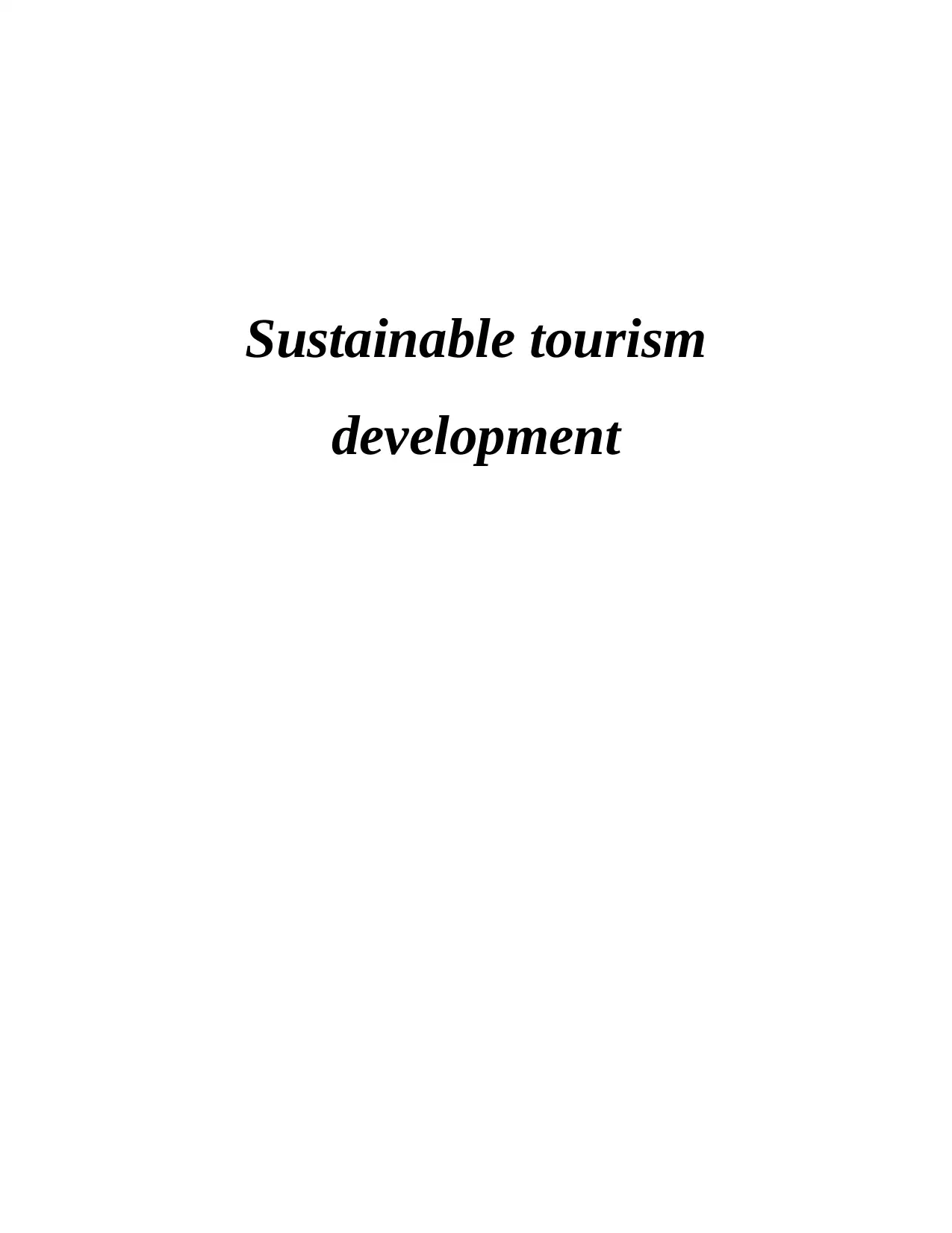
Sustainable tourism
development
development
Paraphrase This Document
Need a fresh take? Get an instant paraphrase of this document with our AI Paraphraser
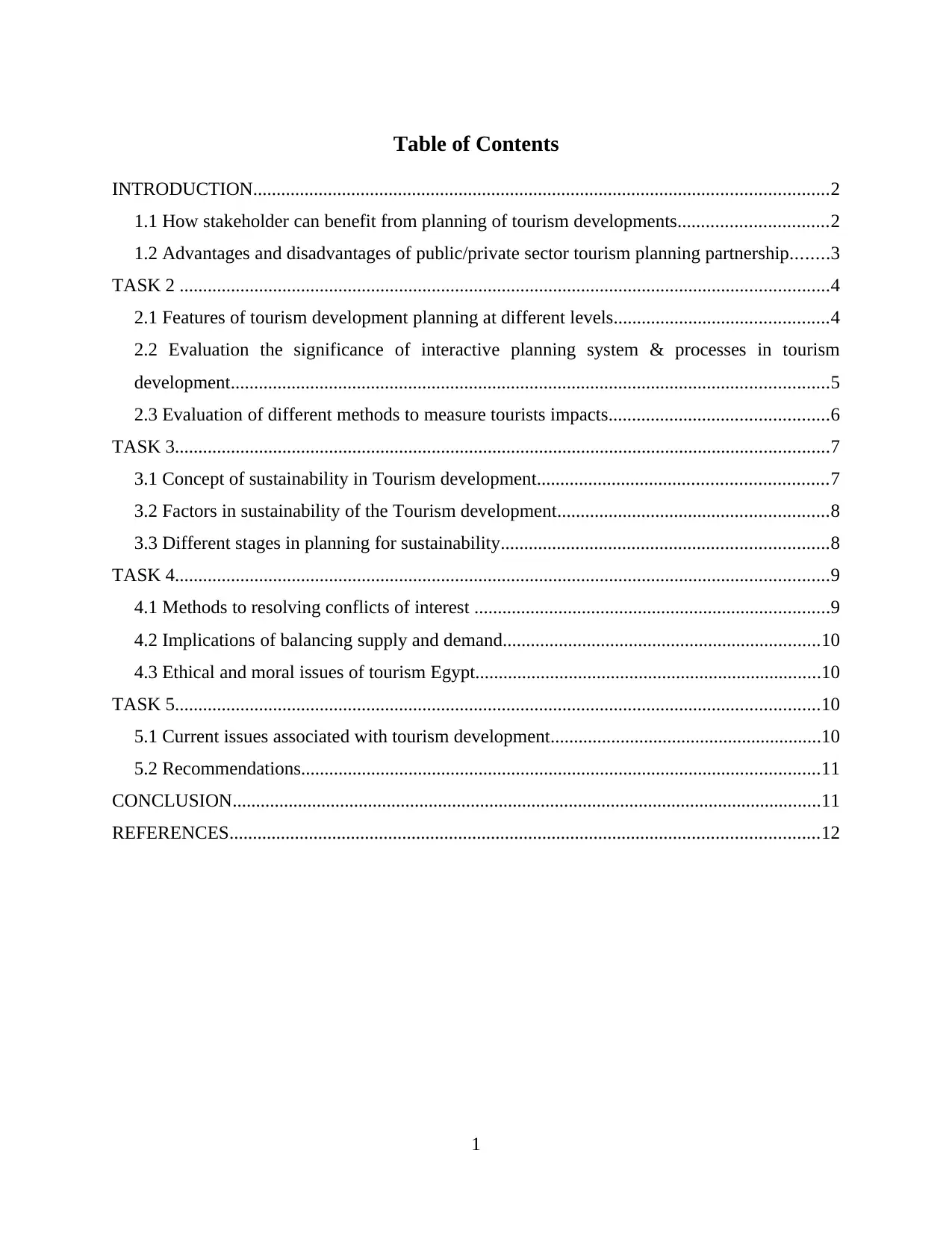
Table of Contents
INTRODUCTION...........................................................................................................................2
1.1 How stakeholder can benefit from planning of tourism developments................................2
1.2 Advantages and disadvantages of public/private sector tourism planning partnership........3
TASK 2 ...........................................................................................................................................4
2.1 Features of tourism development planning at different levels..............................................4
2.2 Evaluation the significance of interactive planning system & processes in tourism
development................................................................................................................................5
2.3 Evaluation of different methods to measure tourists impacts...............................................6
TASK 3............................................................................................................................................7
3.1 Concept of sustainability in Tourism development..............................................................7
3.2 Factors in sustainability of the Tourism development..........................................................8
3.3 Different stages in planning for sustainability......................................................................8
TASK 4............................................................................................................................................9
4.1 Methods to resolving conflicts of interest ............................................................................9
4.2 Implications of balancing supply and demand....................................................................10
4.3 Ethical and moral issues of tourism Egypt..........................................................................10
TASK 5..........................................................................................................................................10
5.1 Current issues associated with tourism development..........................................................10
5.2 Recommendations...............................................................................................................11
CONCLUSION..............................................................................................................................11
REFERENCES..............................................................................................................................12
1
INTRODUCTION...........................................................................................................................2
1.1 How stakeholder can benefit from planning of tourism developments................................2
1.2 Advantages and disadvantages of public/private sector tourism planning partnership........3
TASK 2 ...........................................................................................................................................4
2.1 Features of tourism development planning at different levels..............................................4
2.2 Evaluation the significance of interactive planning system & processes in tourism
development................................................................................................................................5
2.3 Evaluation of different methods to measure tourists impacts...............................................6
TASK 3............................................................................................................................................7
3.1 Concept of sustainability in Tourism development..............................................................7
3.2 Factors in sustainability of the Tourism development..........................................................8
3.3 Different stages in planning for sustainability......................................................................8
TASK 4............................................................................................................................................9
4.1 Methods to resolving conflicts of interest ............................................................................9
4.2 Implications of balancing supply and demand....................................................................10
4.3 Ethical and moral issues of tourism Egypt..........................................................................10
TASK 5..........................................................................................................................................10
5.1 Current issues associated with tourism development..........................................................10
5.2 Recommendations...............................................................................................................11
CONCLUSION..............................................................................................................................11
REFERENCES..............................................................................................................................12
1
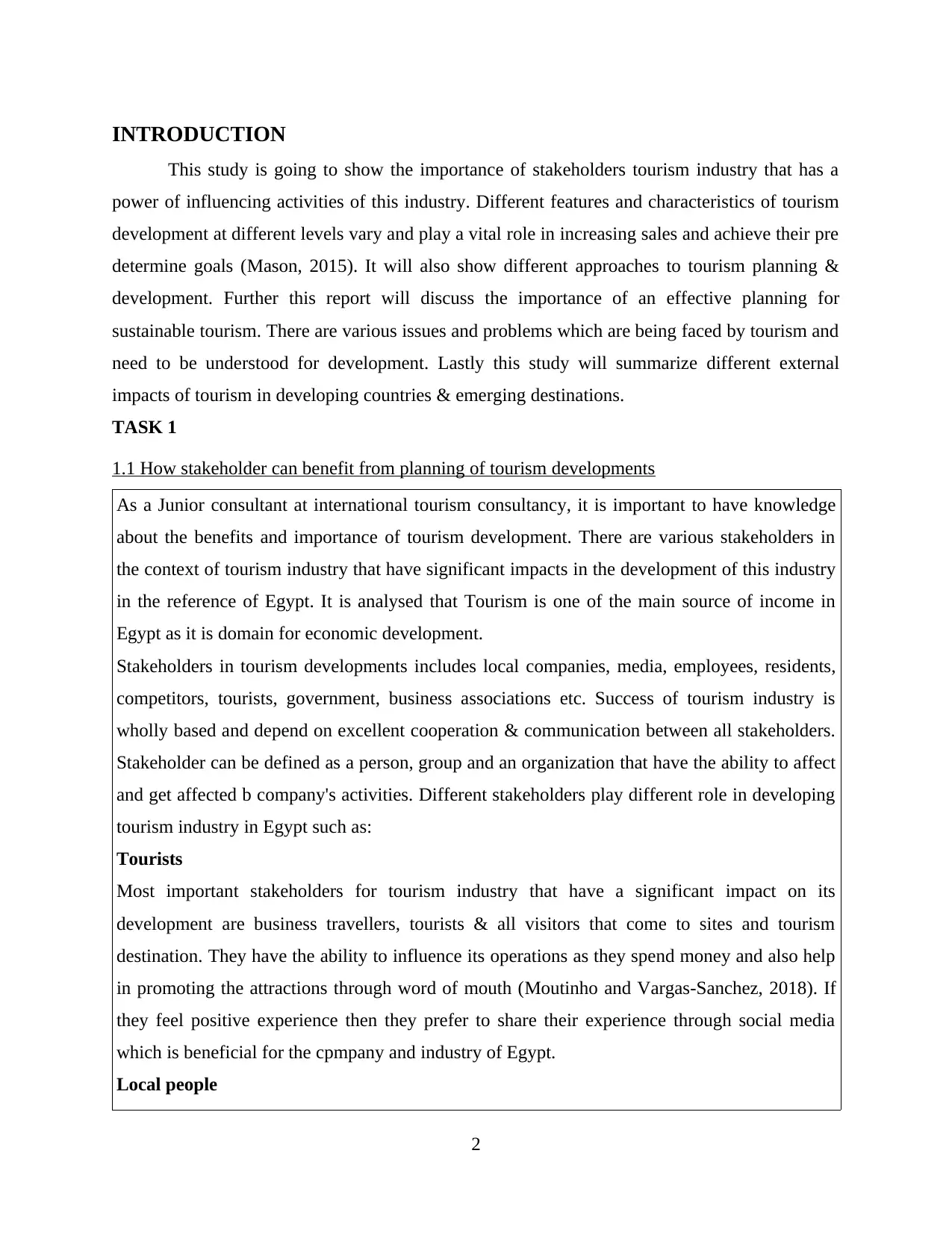
INTRODUCTION
This study is going to show the importance of stakeholders tourism industry that has a
power of influencing activities of this industry. Different features and characteristics of tourism
development at different levels vary and play a vital role in increasing sales and achieve their pre
determine goals (Mason, 2015). It will also show different approaches to tourism planning &
development. Further this report will discuss the importance of an effective planning for
sustainable tourism. There are various issues and problems which are being faced by tourism and
need to be understood for development. Lastly this study will summarize different external
impacts of tourism in developing countries & emerging destinations.
TASK 1
1.1 How stakeholder can benefit from planning of tourism developments
As a Junior consultant at international tourism consultancy, it is important to have knowledge
about the benefits and importance of tourism development. There are various stakeholders in
the context of tourism industry that have significant impacts in the development of this industry
in the reference of Egypt. It is analysed that Tourism is one of the main source of income in
Egypt as it is domain for economic development.
Stakeholders in tourism developments includes local companies, media, employees, residents,
competitors, tourists, government, business associations etc. Success of tourism industry is
wholly based and depend on excellent cooperation & communication between all stakeholders.
Stakeholder can be defined as a person, group and an organization that have the ability to affect
and get affected b company's activities. Different stakeholders play different role in developing
tourism industry in Egypt such as:
Tourists
Most important stakeholders for tourism industry that have a significant impact on its
development are business travellers, tourists & all visitors that come to sites and tourism
destination. They have the ability to influence its operations as they spend money and also help
in promoting the attractions through word of mouth (Moutinho and Vargas-Sanchez, 2018). If
they feel positive experience then they prefer to share their experience through social media
which is beneficial for the cpmpany and industry of Egypt.
Local people
2
This study is going to show the importance of stakeholders tourism industry that has a
power of influencing activities of this industry. Different features and characteristics of tourism
development at different levels vary and play a vital role in increasing sales and achieve their pre
determine goals (Mason, 2015). It will also show different approaches to tourism planning &
development. Further this report will discuss the importance of an effective planning for
sustainable tourism. There are various issues and problems which are being faced by tourism and
need to be understood for development. Lastly this study will summarize different external
impacts of tourism in developing countries & emerging destinations.
TASK 1
1.1 How stakeholder can benefit from planning of tourism developments
As a Junior consultant at international tourism consultancy, it is important to have knowledge
about the benefits and importance of tourism development. There are various stakeholders in
the context of tourism industry that have significant impacts in the development of this industry
in the reference of Egypt. It is analysed that Tourism is one of the main source of income in
Egypt as it is domain for economic development.
Stakeholders in tourism developments includes local companies, media, employees, residents,
competitors, tourists, government, business associations etc. Success of tourism industry is
wholly based and depend on excellent cooperation & communication between all stakeholders.
Stakeholder can be defined as a person, group and an organization that have the ability to affect
and get affected b company's activities. Different stakeholders play different role in developing
tourism industry in Egypt such as:
Tourists
Most important stakeholders for tourism industry that have a significant impact on its
development are business travellers, tourists & all visitors that come to sites and tourism
destination. They have the ability to influence its operations as they spend money and also help
in promoting the attractions through word of mouth (Moutinho and Vargas-Sanchez, 2018). If
they feel positive experience then they prefer to share their experience through social media
which is beneficial for the cpmpany and industry of Egypt.
Local people
2
⊘ This is a preview!⊘
Do you want full access?
Subscribe today to unlock all pages.

Trusted by 1+ million students worldwide
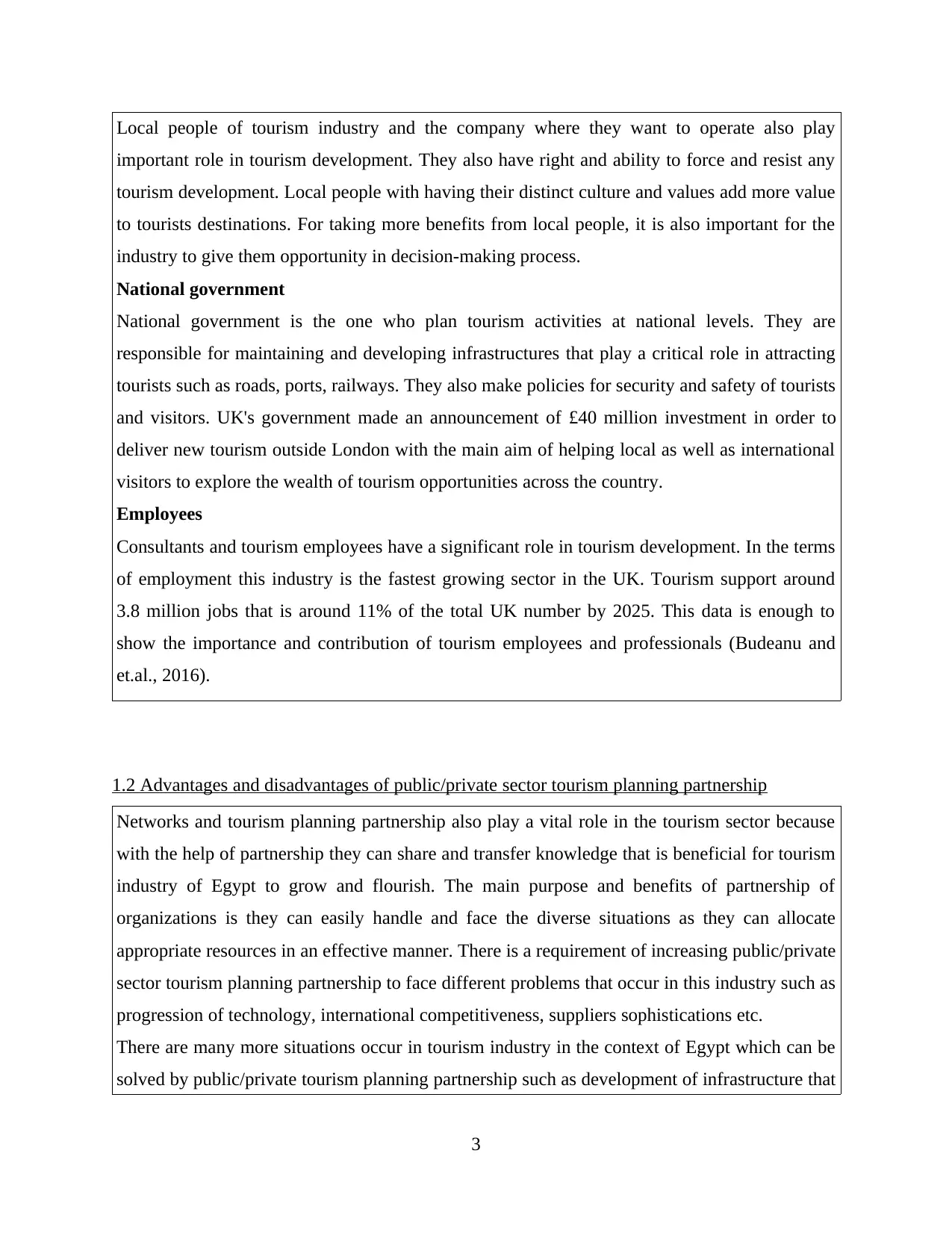
Local people of tourism industry and the company where they want to operate also play
important role in tourism development. They also have right and ability to force and resist any
tourism development. Local people with having their distinct culture and values add more value
to tourists destinations. For taking more benefits from local people, it is also important for the
industry to give them opportunity in decision-making process.
National government
National government is the one who plan tourism activities at national levels. They are
responsible for maintaining and developing infrastructures that play a critical role in attracting
tourists such as roads, ports, railways. They also make policies for security and safety of tourists
and visitors. UK's government made an announcement of £40 million investment in order to
deliver new tourism outside London with the main aim of helping local as well as international
visitors to explore the wealth of tourism opportunities across the country.
Employees
Consultants and tourism employees have a significant role in tourism development. In the terms
of employment this industry is the fastest growing sector in the UK. Tourism support around
3.8 million jobs that is around 11% of the total UK number by 2025. This data is enough to
show the importance and contribution of tourism employees and professionals (Budeanu and
et.al., 2016).
1.2 Advantages and disadvantages of public/private sector tourism planning partnership
Networks and tourism planning partnership also play a vital role in the tourism sector because
with the help of partnership they can share and transfer knowledge that is beneficial for tourism
industry of Egypt to grow and flourish. The main purpose and benefits of partnership of
organizations is they can easily handle and face the diverse situations as they can allocate
appropriate resources in an effective manner. There is a requirement of increasing public/private
sector tourism planning partnership to face different problems that occur in this industry such as
progression of technology, international competitiveness, suppliers sophistications etc.
There are many more situations occur in tourism industry in the context of Egypt which can be
solved by public/private tourism planning partnership such as development of infrastructure that
3
important role in tourism development. They also have right and ability to force and resist any
tourism development. Local people with having their distinct culture and values add more value
to tourists destinations. For taking more benefits from local people, it is also important for the
industry to give them opportunity in decision-making process.
National government
National government is the one who plan tourism activities at national levels. They are
responsible for maintaining and developing infrastructures that play a critical role in attracting
tourists such as roads, ports, railways. They also make policies for security and safety of tourists
and visitors. UK's government made an announcement of £40 million investment in order to
deliver new tourism outside London with the main aim of helping local as well as international
visitors to explore the wealth of tourism opportunities across the country.
Employees
Consultants and tourism employees have a significant role in tourism development. In the terms
of employment this industry is the fastest growing sector in the UK. Tourism support around
3.8 million jobs that is around 11% of the total UK number by 2025. This data is enough to
show the importance and contribution of tourism employees and professionals (Budeanu and
et.al., 2016).
1.2 Advantages and disadvantages of public/private sector tourism planning partnership
Networks and tourism planning partnership also play a vital role in the tourism sector because
with the help of partnership they can share and transfer knowledge that is beneficial for tourism
industry of Egypt to grow and flourish. The main purpose and benefits of partnership of
organizations is they can easily handle and face the diverse situations as they can allocate
appropriate resources in an effective manner. There is a requirement of increasing public/private
sector tourism planning partnership to face different problems that occur in this industry such as
progression of technology, international competitiveness, suppliers sophistications etc.
There are many more situations occur in tourism industry in the context of Egypt which can be
solved by public/private tourism planning partnership such as development of infrastructure that
3
Paraphrase This Document
Need a fresh take? Get an instant paraphrase of this document with our AI Paraphraser
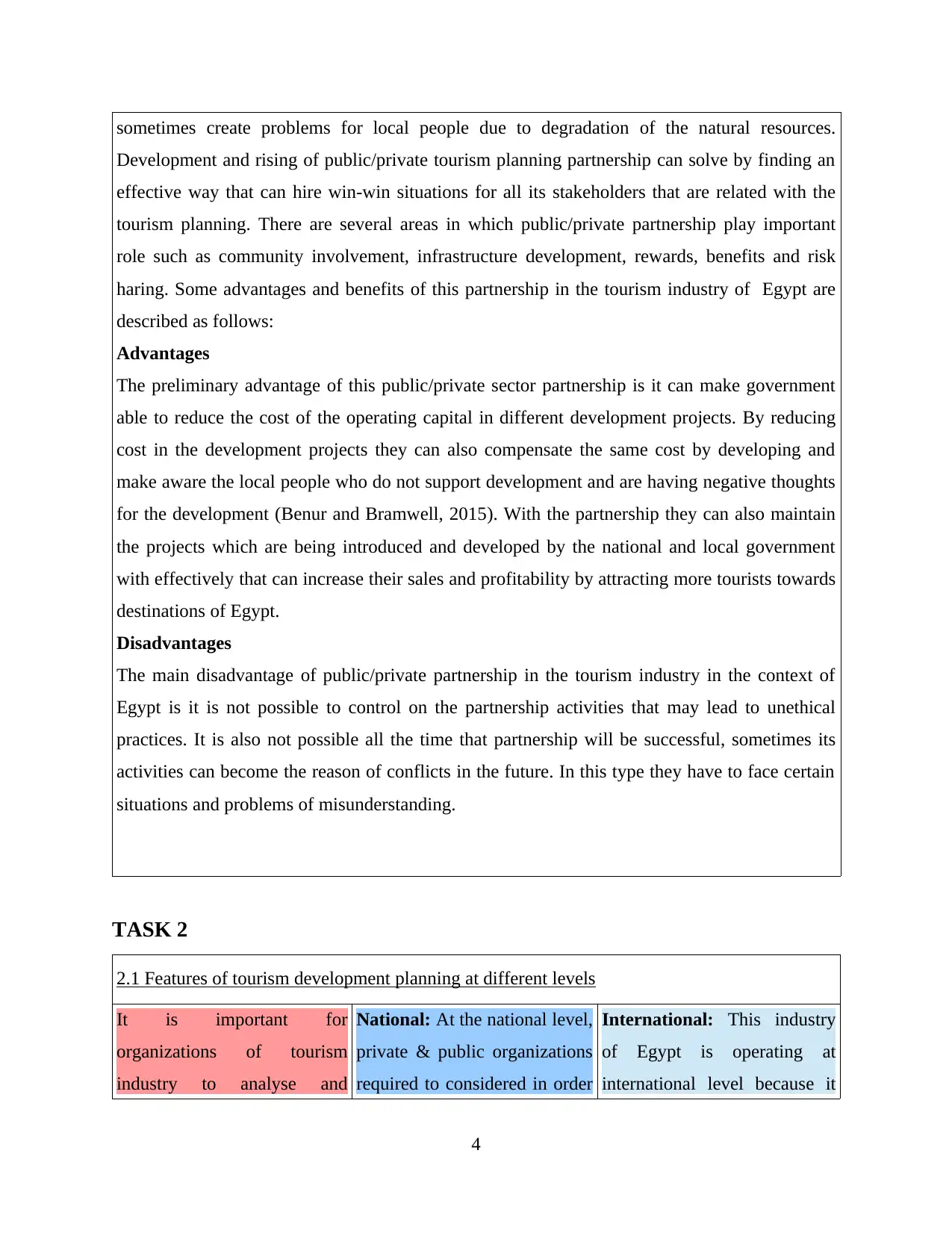
sometimes create problems for local people due to degradation of the natural resources.
Development and rising of public/private tourism planning partnership can solve by finding an
effective way that can hire win-win situations for all its stakeholders that are related with the
tourism planning. There are several areas in which public/private partnership play important
role such as community involvement, infrastructure development, rewards, benefits and risk
haring. Some advantages and benefits of this partnership in the tourism industry of Egypt are
described as follows:
Advantages
The preliminary advantage of this public/private sector partnership is it can make government
able to reduce the cost of the operating capital in different development projects. By reducing
cost in the development projects they can also compensate the same cost by developing and
make aware the local people who do not support development and are having negative thoughts
for the development (Benur and Bramwell, 2015). With the partnership they can also maintain
the projects which are being introduced and developed by the national and local government
with effectively that can increase their sales and profitability by attracting more tourists towards
destinations of Egypt.
Disadvantages
The main disadvantage of public/private partnership in the tourism industry in the context of
Egypt is it is not possible to control on the partnership activities that may lead to unethical
practices. It is also not possible all the time that partnership will be successful, sometimes its
activities can become the reason of conflicts in the future. In this type they have to face certain
situations and problems of misunderstanding.
TASK 2
2.1 Features of tourism development planning at different levels
It is important for
organizations of tourism
industry to analyse and
National: At the national level,
private & public organizations
required to considered in order
International: This industry
of Egypt is operating at
international level because it
4
Development and rising of public/private tourism planning partnership can solve by finding an
effective way that can hire win-win situations for all its stakeholders that are related with the
tourism planning. There are several areas in which public/private partnership play important
role such as community involvement, infrastructure development, rewards, benefits and risk
haring. Some advantages and benefits of this partnership in the tourism industry of Egypt are
described as follows:
Advantages
The preliminary advantage of this public/private sector partnership is it can make government
able to reduce the cost of the operating capital in different development projects. By reducing
cost in the development projects they can also compensate the same cost by developing and
make aware the local people who do not support development and are having negative thoughts
for the development (Benur and Bramwell, 2015). With the partnership they can also maintain
the projects which are being introduced and developed by the national and local government
with effectively that can increase their sales and profitability by attracting more tourists towards
destinations of Egypt.
Disadvantages
The main disadvantage of public/private partnership in the tourism industry in the context of
Egypt is it is not possible to control on the partnership activities that may lead to unethical
practices. It is also not possible all the time that partnership will be successful, sometimes its
activities can become the reason of conflicts in the future. In this type they have to face certain
situations and problems of misunderstanding.
TASK 2
2.1 Features of tourism development planning at different levels
It is important for
organizations of tourism
industry to analyse and
National: At the national level,
private & public organizations
required to considered in order
International: This industry
of Egypt is operating at
international level because it
4
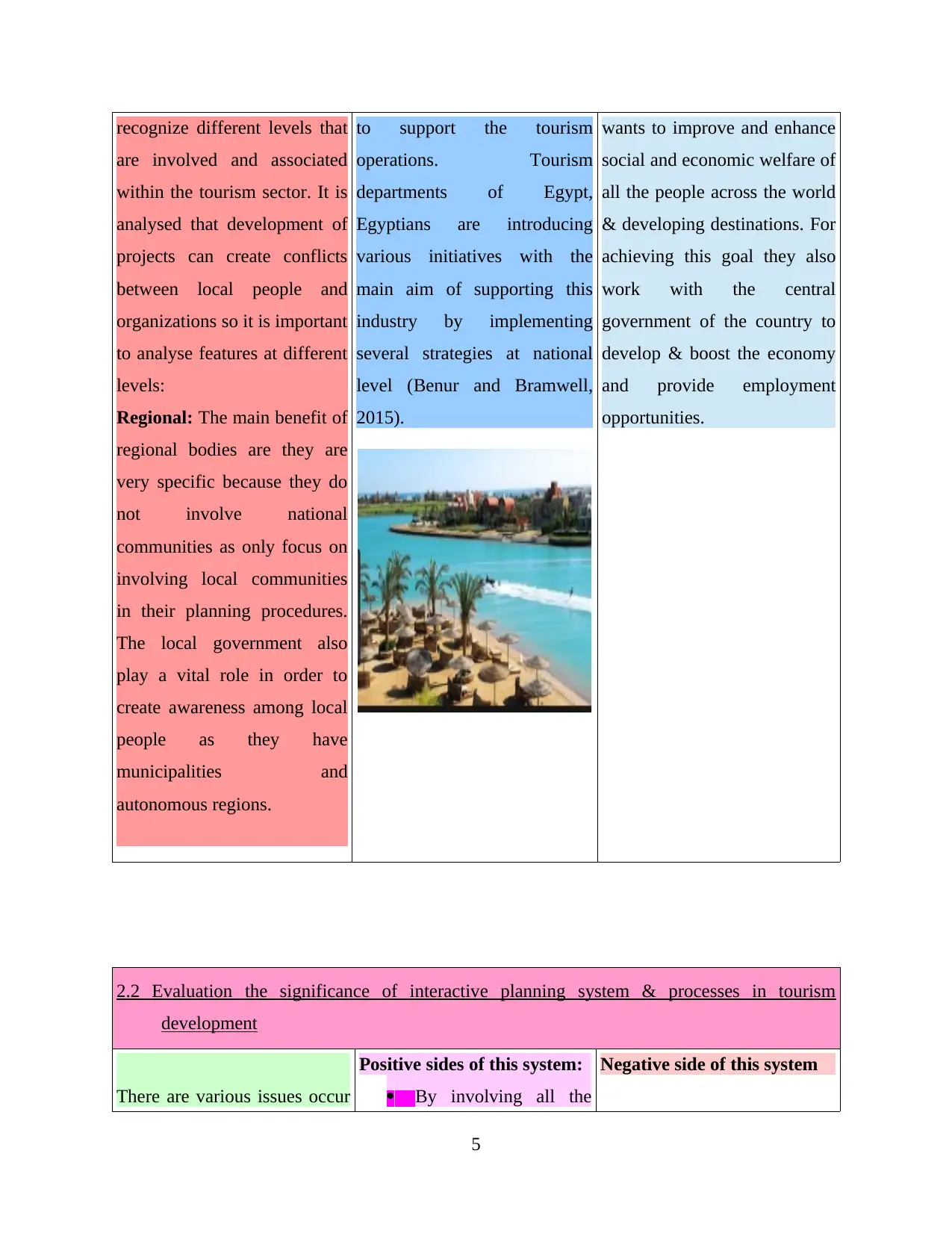
recognize different levels that
are involved and associated
within the tourism sector. It is
analysed that development of
projects can create conflicts
between local people and
organizations so it is important
to analyse features at different
levels:
Regional: The main benefit of
regional bodies are they are
very specific because they do
not involve national
communities as only focus on
involving local communities
in their planning procedures.
The local government also
play a vital role in order to
create awareness among local
people as they have
municipalities and
autonomous regions.
to support the tourism
operations. Tourism
departments of Egypt,
Egyptians are introducing
various initiatives with the
main aim of supporting this
industry by implementing
several strategies at national
level (Benur and Bramwell,
2015).
wants to improve and enhance
social and economic welfare of
all the people across the world
& developing destinations. For
achieving this goal they also
work with the central
government of the country to
develop & boost the economy
and provide employment
opportunities.
2.2 Evaluation the significance of interactive planning system & processes in tourism
development
There are various issues occur
Positive sides of this system:
By involving all the
Negative side of this system
5
are involved and associated
within the tourism sector. It is
analysed that development of
projects can create conflicts
between local people and
organizations so it is important
to analyse features at different
levels:
Regional: The main benefit of
regional bodies are they are
very specific because they do
not involve national
communities as only focus on
involving local communities
in their planning procedures.
The local government also
play a vital role in order to
create awareness among local
people as they have
municipalities and
autonomous regions.
to support the tourism
operations. Tourism
departments of Egypt,
Egyptians are introducing
various initiatives with the
main aim of supporting this
industry by implementing
several strategies at national
level (Benur and Bramwell,
2015).
wants to improve and enhance
social and economic welfare of
all the people across the world
& developing destinations. For
achieving this goal they also
work with the central
government of the country to
develop & boost the economy
and provide employment
opportunities.
2.2 Evaluation the significance of interactive planning system & processes in tourism
development
There are various issues occur
Positive sides of this system:
By involving all the
Negative side of this system
5
⊘ This is a preview!⊘
Do you want full access?
Subscribe today to unlock all pages.

Trusted by 1+ million students worldwide
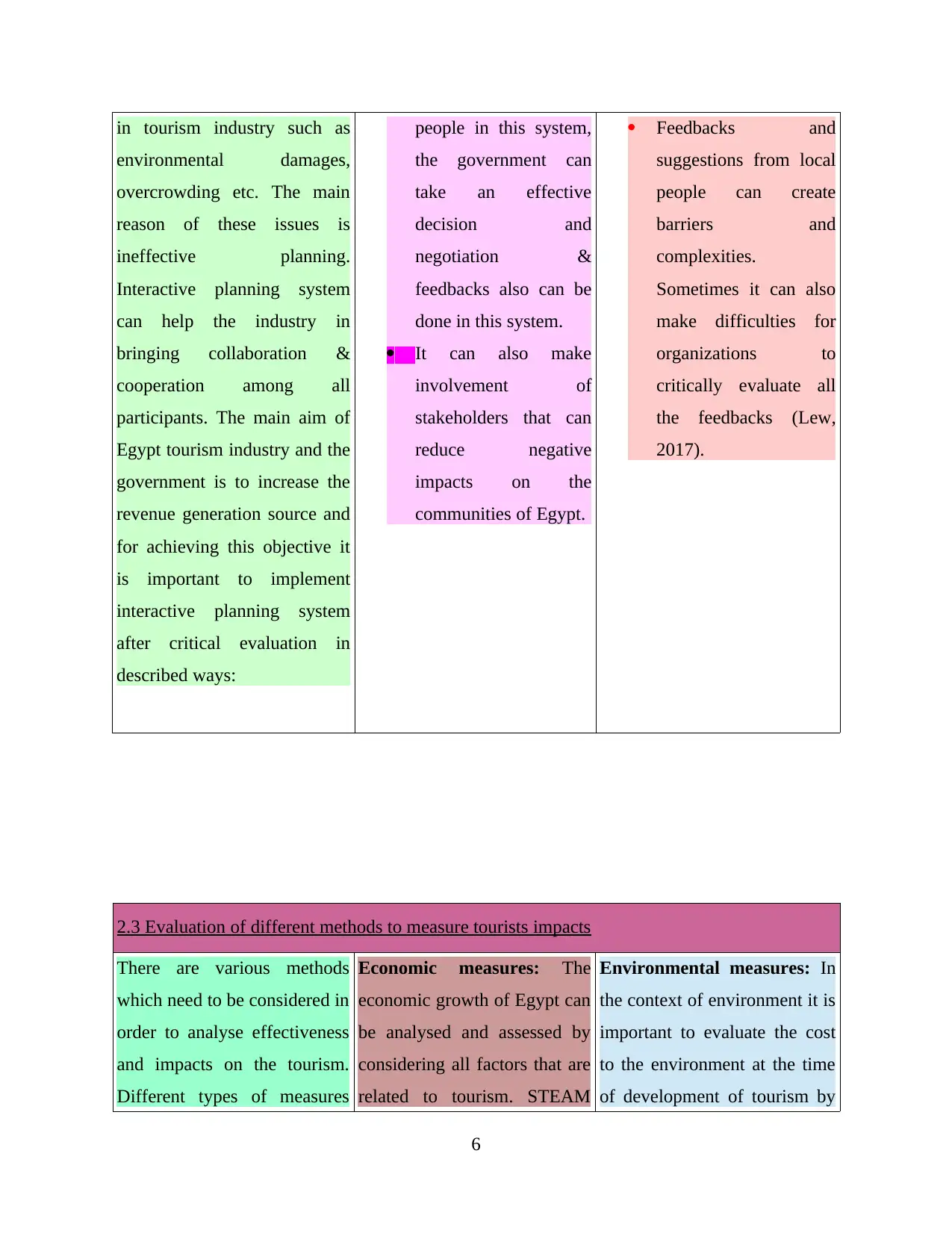
in tourism industry such as
environmental damages,
overcrowding etc. The main
reason of these issues is
ineffective planning.
Interactive planning system
can help the industry in
bringing collaboration &
cooperation among all
participants. The main aim of
Egypt tourism industry and the
government is to increase the
revenue generation source and
for achieving this objective it
is important to implement
interactive planning system
after critical evaluation in
described ways:
people in this system,
the government can
take an effective
decision and
negotiation &
feedbacks also can be
done in this system.
It can also make
involvement of
stakeholders that can
reduce negative
impacts on the
communities of Egypt.
Feedbacks and
suggestions from local
people can create
barriers and
complexities.
Sometimes it can also
make difficulties for
organizations to
critically evaluate all
the feedbacks (Lew,
2017).
2.3 Evaluation of different methods to measure tourists impacts
There are various methods
which need to be considered in
order to analyse effectiveness
and impacts on the tourism.
Different types of measures
Economic measures: The
economic growth of Egypt can
be analysed and assessed by
considering all factors that are
related to tourism. STEAM
Environmental measures: In
the context of environment it is
important to evaluate the cost
to the environment at the time
of development of tourism by
6
environmental damages,
overcrowding etc. The main
reason of these issues is
ineffective planning.
Interactive planning system
can help the industry in
bringing collaboration &
cooperation among all
participants. The main aim of
Egypt tourism industry and the
government is to increase the
revenue generation source and
for achieving this objective it
is important to implement
interactive planning system
after critical evaluation in
described ways:
people in this system,
the government can
take an effective
decision and
negotiation &
feedbacks also can be
done in this system.
It can also make
involvement of
stakeholders that can
reduce negative
impacts on the
communities of Egypt.
Feedbacks and
suggestions from local
people can create
barriers and
complexities.
Sometimes it can also
make difficulties for
organizations to
critically evaluate all
the feedbacks (Lew,
2017).
2.3 Evaluation of different methods to measure tourists impacts
There are various methods
which need to be considered in
order to analyse effectiveness
and impacts on the tourism.
Different types of measures
Economic measures: The
economic growth of Egypt can
be analysed and assessed by
considering all factors that are
related to tourism. STEAM
Environmental measures: In
the context of environment it is
important to evaluate the cost
to the environment at the time
of development of tourism by
6
Paraphrase This Document
Need a fresh take? Get an instant paraphrase of this document with our AI Paraphraser
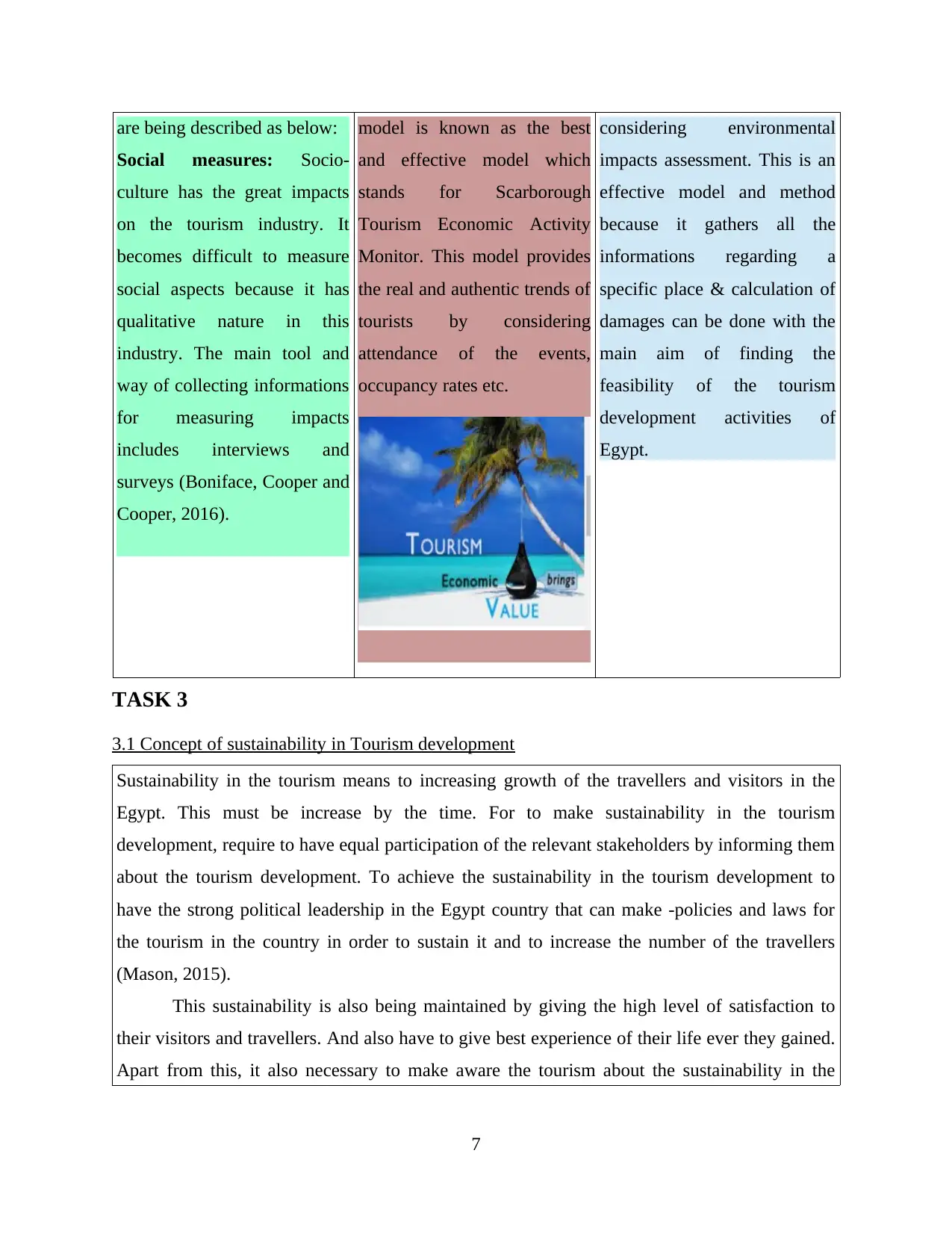
are being described as below:
Social measures: Socio-
culture has the great impacts
on the tourism industry. It
becomes difficult to measure
social aspects because it has
qualitative nature in this
industry. The main tool and
way of collecting informations
for measuring impacts
includes interviews and
surveys (Boniface, Cooper and
Cooper, 2016).
model is known as the best
and effective model which
stands for Scarborough
Tourism Economic Activity
Monitor. This model provides
the real and authentic trends of
tourists by considering
attendance of the events,
occupancy rates etc.
considering environmental
impacts assessment. This is an
effective model and method
because it gathers all the
informations regarding a
specific place & calculation of
damages can be done with the
main aim of finding the
feasibility of the tourism
development activities of
Egypt.
TASK 3
3.1 Concept of sustainability in Tourism development
Sustainability in the tourism means to increasing growth of the travellers and visitors in the
Egypt. This must be increase by the time. For to make sustainability in the tourism
development, require to have equal participation of the relevant stakeholders by informing them
about the tourism development. To achieve the sustainability in the tourism development to
have the strong political leadership in the Egypt country that can make -policies and laws for
the tourism in the country in order to sustain it and to increase the number of the travellers
(Mason, 2015).
This sustainability is also being maintained by giving the high level of satisfaction to
their visitors and travellers. And also have to give best experience of their life ever they gained.
Apart from this, it also necessary to make aware the tourism about the sustainability in the
7
Social measures: Socio-
culture has the great impacts
on the tourism industry. It
becomes difficult to measure
social aspects because it has
qualitative nature in this
industry. The main tool and
way of collecting informations
for measuring impacts
includes interviews and
surveys (Boniface, Cooper and
Cooper, 2016).
model is known as the best
and effective model which
stands for Scarborough
Tourism Economic Activity
Monitor. This model provides
the real and authentic trends of
tourists by considering
attendance of the events,
occupancy rates etc.
considering environmental
impacts assessment. This is an
effective model and method
because it gathers all the
informations regarding a
specific place & calculation of
damages can be done with the
main aim of finding the
feasibility of the tourism
development activities of
Egypt.
TASK 3
3.1 Concept of sustainability in Tourism development
Sustainability in the tourism means to increasing growth of the travellers and visitors in the
Egypt. This must be increase by the time. For to make sustainability in the tourism
development, require to have equal participation of the relevant stakeholders by informing them
about the tourism development. To achieve the sustainability in the tourism development to
have the strong political leadership in the Egypt country that can make -policies and laws for
the tourism in the country in order to sustain it and to increase the number of the travellers
(Mason, 2015).
This sustainability is also being maintained by giving the high level of satisfaction to
their visitors and travellers. And also have to give best experience of their life ever they gained.
Apart from this, it also necessary to make aware the tourism about the sustainability in the
7
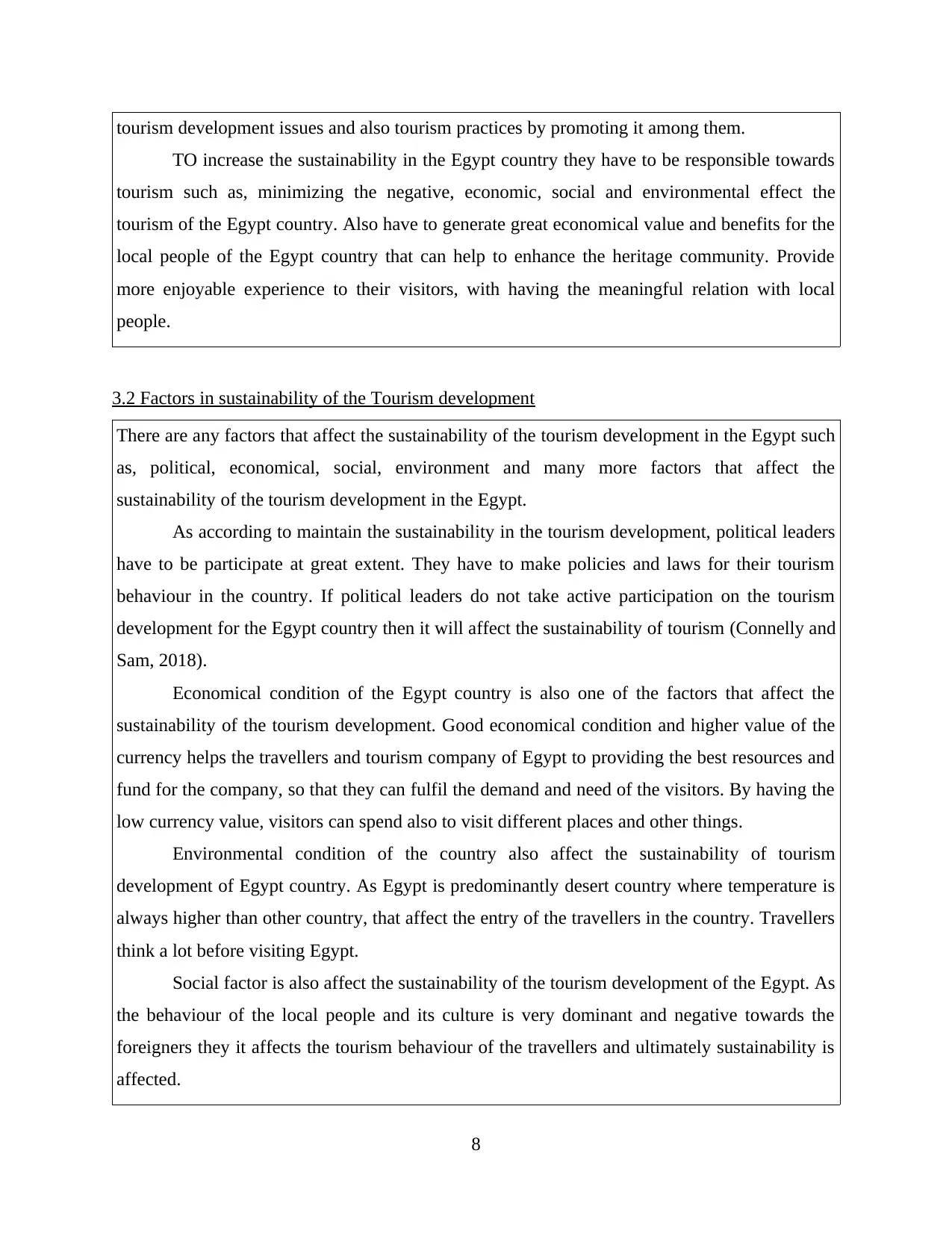
tourism development issues and also tourism practices by promoting it among them.
TO increase the sustainability in the Egypt country they have to be responsible towards
tourism such as, minimizing the negative, economic, social and environmental effect the
tourism of the Egypt country. Also have to generate great economical value and benefits for the
local people of the Egypt country that can help to enhance the heritage community. Provide
more enjoyable experience to their visitors, with having the meaningful relation with local
people.
3.2 Factors in sustainability of the Tourism development
There are any factors that affect the sustainability of the tourism development in the Egypt such
as, political, economical, social, environment and many more factors that affect the
sustainability of the tourism development in the Egypt.
As according to maintain the sustainability in the tourism development, political leaders
have to be participate at great extent. They have to make policies and laws for their tourism
behaviour in the country. If political leaders do not take active participation on the tourism
development for the Egypt country then it will affect the sustainability of tourism (Connelly and
Sam, 2018).
Economical condition of the Egypt country is also one of the factors that affect the
sustainability of the tourism development. Good economical condition and higher value of the
currency helps the travellers and tourism company of Egypt to providing the best resources and
fund for the company, so that they can fulfil the demand and need of the visitors. By having the
low currency value, visitors can spend also to visit different places and other things.
Environmental condition of the country also affect the sustainability of tourism
development of Egypt country. As Egypt is predominantly desert country where temperature is
always higher than other country, that affect the entry of the travellers in the country. Travellers
think a lot before visiting Egypt.
Social factor is also affect the sustainability of the tourism development of the Egypt. As
the behaviour of the local people and its culture is very dominant and negative towards the
foreigners they it affects the tourism behaviour of the travellers and ultimately sustainability is
affected.
8
TO increase the sustainability in the Egypt country they have to be responsible towards
tourism such as, minimizing the negative, economic, social and environmental effect the
tourism of the Egypt country. Also have to generate great economical value and benefits for the
local people of the Egypt country that can help to enhance the heritage community. Provide
more enjoyable experience to their visitors, with having the meaningful relation with local
people.
3.2 Factors in sustainability of the Tourism development
There are any factors that affect the sustainability of the tourism development in the Egypt such
as, political, economical, social, environment and many more factors that affect the
sustainability of the tourism development in the Egypt.
As according to maintain the sustainability in the tourism development, political leaders
have to be participate at great extent. They have to make policies and laws for their tourism
behaviour in the country. If political leaders do not take active participation on the tourism
development for the Egypt country then it will affect the sustainability of tourism (Connelly and
Sam, 2018).
Economical condition of the Egypt country is also one of the factors that affect the
sustainability of the tourism development. Good economical condition and higher value of the
currency helps the travellers and tourism company of Egypt to providing the best resources and
fund for the company, so that they can fulfil the demand and need of the visitors. By having the
low currency value, visitors can spend also to visit different places and other things.
Environmental condition of the country also affect the sustainability of tourism
development of Egypt country. As Egypt is predominantly desert country where temperature is
always higher than other country, that affect the entry of the travellers in the country. Travellers
think a lot before visiting Egypt.
Social factor is also affect the sustainability of the tourism development of the Egypt. As
the behaviour of the local people and its culture is very dominant and negative towards the
foreigners they it affects the tourism behaviour of the travellers and ultimately sustainability is
affected.
8
⊘ This is a preview!⊘
Do you want full access?
Subscribe today to unlock all pages.

Trusted by 1+ million students worldwide
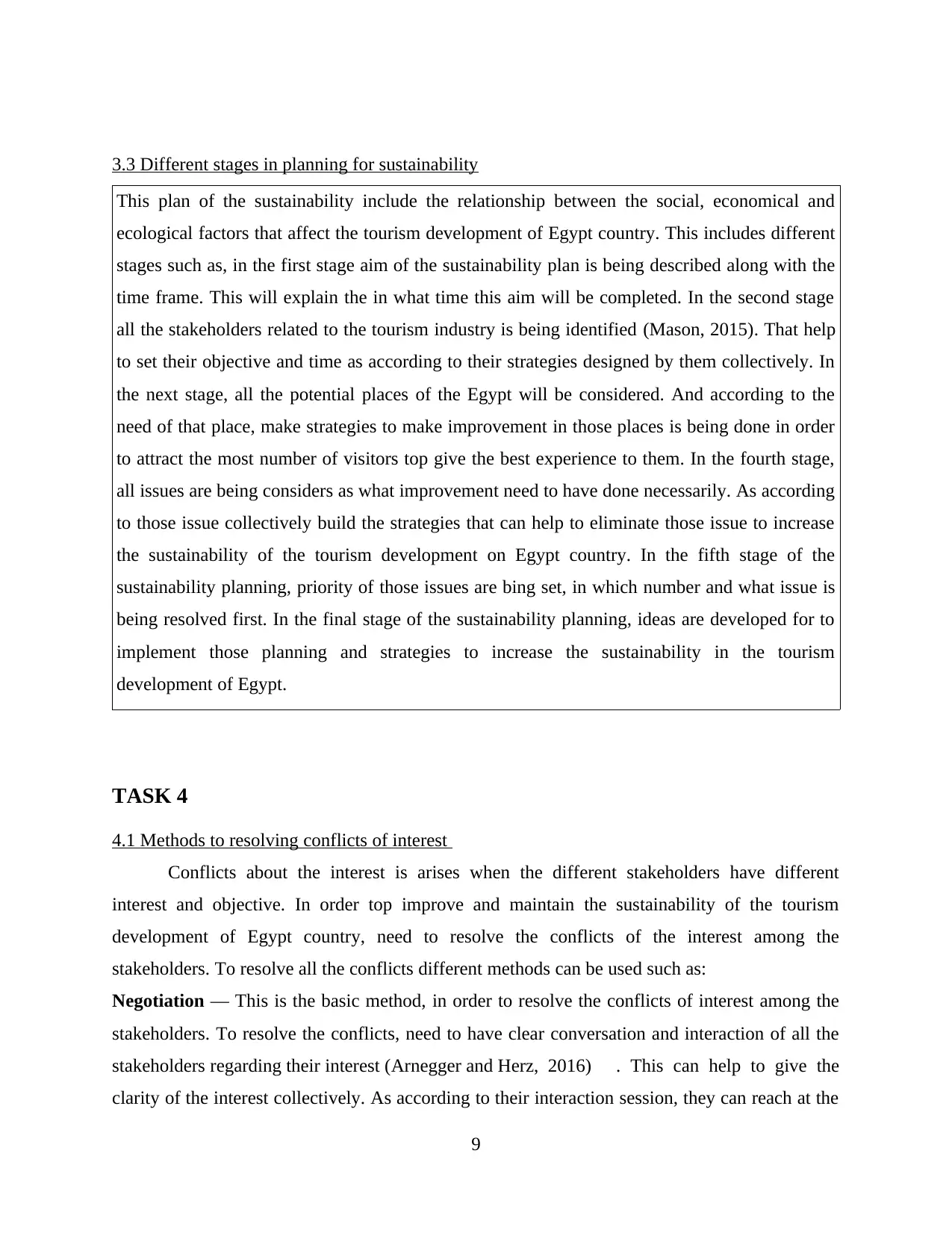
3.3 Different stages in planning for sustainability
This plan of the sustainability include the relationship between the social, economical and
ecological factors that affect the tourism development of Egypt country. This includes different
stages such as, in the first stage aim of the sustainability plan is being described along with the
time frame. This will explain the in what time this aim will be completed. In the second stage
all the stakeholders related to the tourism industry is being identified (Mason, 2015). That help
to set their objective and time as according to their strategies designed by them collectively. In
the next stage, all the potential places of the Egypt will be considered. And according to the
need of that place, make strategies to make improvement in those places is being done in order
to attract the most number of visitors top give the best experience to them. In the fourth stage,
all issues are being considers as what improvement need to have done necessarily. As according
to those issue collectively build the strategies that can help to eliminate those issue to increase
the sustainability of the tourism development on Egypt country. In the fifth stage of the
sustainability planning, priority of those issues are bing set, in which number and what issue is
being resolved first. In the final stage of the sustainability planning, ideas are developed for to
implement those planning and strategies to increase the sustainability in the tourism
development of Egypt.
TASK 4
4.1 Methods to resolving conflicts of interest
Conflicts about the interest is arises when the different stakeholders have different
interest and objective. In order top improve and maintain the sustainability of the tourism
development of Egypt country, need to resolve the conflicts of the interest among the
stakeholders. To resolve all the conflicts different methods can be used such as:
Negotiation — This is the basic method, in order to resolve the conflicts of interest among the
stakeholders. To resolve the conflicts, need to have clear conversation and interaction of all the
stakeholders regarding their interest (Arnegger and Herz, 2016) . This can help to give the
clarity of the interest collectively. As according to their interaction session, they can reach at the
9
This plan of the sustainability include the relationship between the social, economical and
ecological factors that affect the tourism development of Egypt country. This includes different
stages such as, in the first stage aim of the sustainability plan is being described along with the
time frame. This will explain the in what time this aim will be completed. In the second stage
all the stakeholders related to the tourism industry is being identified (Mason, 2015). That help
to set their objective and time as according to their strategies designed by them collectively. In
the next stage, all the potential places of the Egypt will be considered. And according to the
need of that place, make strategies to make improvement in those places is being done in order
to attract the most number of visitors top give the best experience to them. In the fourth stage,
all issues are being considers as what improvement need to have done necessarily. As according
to those issue collectively build the strategies that can help to eliminate those issue to increase
the sustainability of the tourism development on Egypt country. In the fifth stage of the
sustainability planning, priority of those issues are bing set, in which number and what issue is
being resolved first. In the final stage of the sustainability planning, ideas are developed for to
implement those planning and strategies to increase the sustainability in the tourism
development of Egypt.
TASK 4
4.1 Methods to resolving conflicts of interest
Conflicts about the interest is arises when the different stakeholders have different
interest and objective. In order top improve and maintain the sustainability of the tourism
development of Egypt country, need to resolve the conflicts of the interest among the
stakeholders. To resolve all the conflicts different methods can be used such as:
Negotiation — This is the basic method, in order to resolve the conflicts of interest among the
stakeholders. To resolve the conflicts, need to have clear conversation and interaction of all the
stakeholders regarding their interest (Arnegger and Herz, 2016) . This can help to give the
clarity of the interest collectively. As according to their interaction session, they can reach at the
9
Paraphrase This Document
Need a fresh take? Get an instant paraphrase of this document with our AI Paraphraser
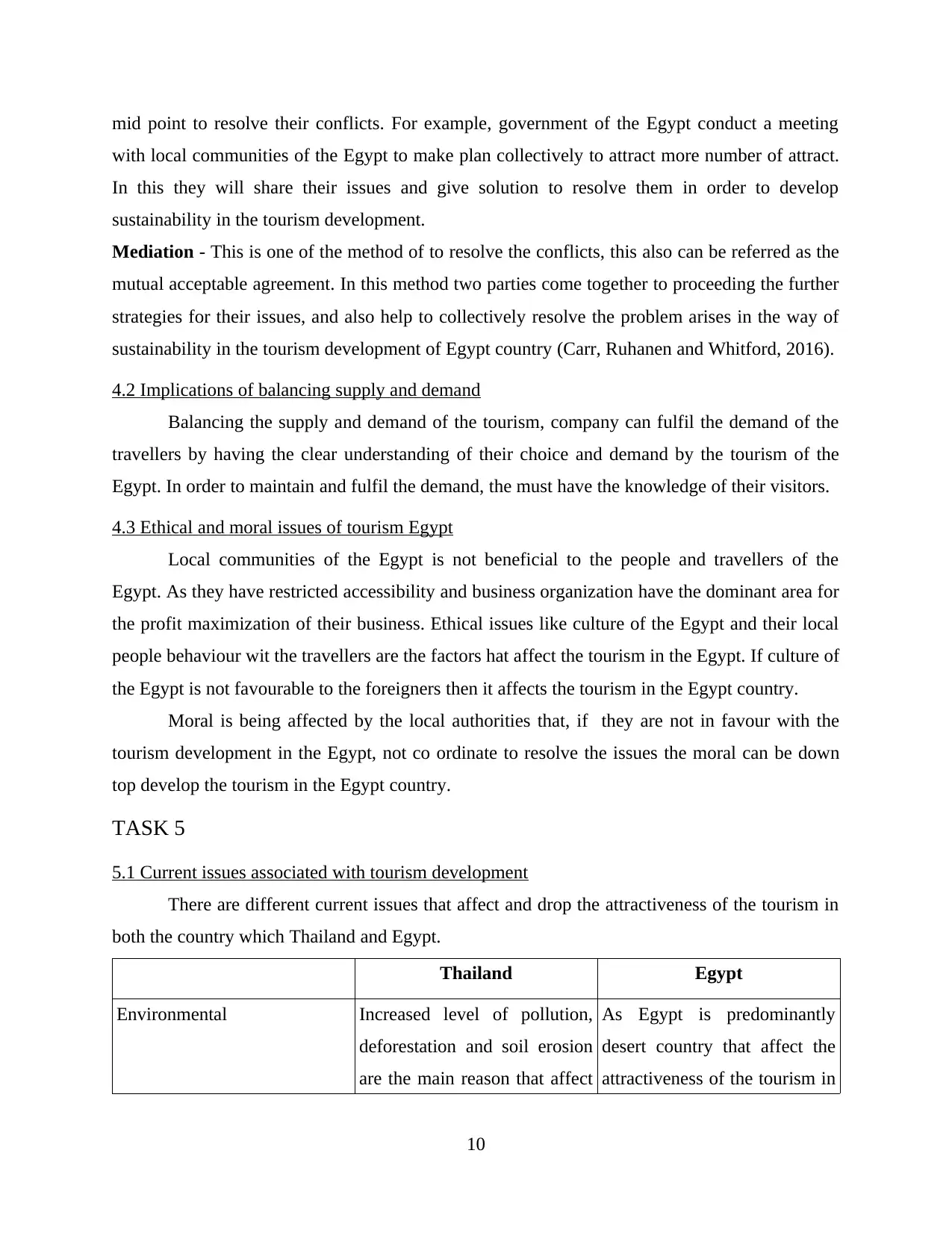
mid point to resolve their conflicts. For example, government of the Egypt conduct a meeting
with local communities of the Egypt to make plan collectively to attract more number of attract.
In this they will share their issues and give solution to resolve them in order to develop
sustainability in the tourism development.
Mediation - This is one of the method of to resolve the conflicts, this also can be referred as the
mutual acceptable agreement. In this method two parties come together to proceeding the further
strategies for their issues, and also help to collectively resolve the problem arises in the way of
sustainability in the tourism development of Egypt country (Carr, Ruhanen and Whitford, 2016).
4.2 Implications of balancing supply and demand
Balancing the supply and demand of the tourism, company can fulfil the demand of the
travellers by having the clear understanding of their choice and demand by the tourism of the
Egypt. In order to maintain and fulfil the demand, the must have the knowledge of their visitors.
4.3 Ethical and moral issues of tourism Egypt
Local communities of the Egypt is not beneficial to the people and travellers of the
Egypt. As they have restricted accessibility and business organization have the dominant area for
the profit maximization of their business. Ethical issues like culture of the Egypt and their local
people behaviour wit the travellers are the factors hat affect the tourism in the Egypt. If culture of
the Egypt is not favourable to the foreigners then it affects the tourism in the Egypt country.
Moral is being affected by the local authorities that, if they are not in favour with the
tourism development in the Egypt, not co ordinate to resolve the issues the moral can be down
top develop the tourism in the Egypt country.
TASK 5
5.1 Current issues associated with tourism development
There are different current issues that affect and drop the attractiveness of the tourism in
both the country which Thailand and Egypt.
Thailand Egypt
Environmental Increased level of pollution,
deforestation and soil erosion
are the main reason that affect
As Egypt is predominantly
desert country that affect the
attractiveness of the tourism in
10
with local communities of the Egypt to make plan collectively to attract more number of attract.
In this they will share their issues and give solution to resolve them in order to develop
sustainability in the tourism development.
Mediation - This is one of the method of to resolve the conflicts, this also can be referred as the
mutual acceptable agreement. In this method two parties come together to proceeding the further
strategies for their issues, and also help to collectively resolve the problem arises in the way of
sustainability in the tourism development of Egypt country (Carr, Ruhanen and Whitford, 2016).
4.2 Implications of balancing supply and demand
Balancing the supply and demand of the tourism, company can fulfil the demand of the
travellers by having the clear understanding of their choice and demand by the tourism of the
Egypt. In order to maintain and fulfil the demand, the must have the knowledge of their visitors.
4.3 Ethical and moral issues of tourism Egypt
Local communities of the Egypt is not beneficial to the people and travellers of the
Egypt. As they have restricted accessibility and business organization have the dominant area for
the profit maximization of their business. Ethical issues like culture of the Egypt and their local
people behaviour wit the travellers are the factors hat affect the tourism in the Egypt. If culture of
the Egypt is not favourable to the foreigners then it affects the tourism in the Egypt country.
Moral is being affected by the local authorities that, if they are not in favour with the
tourism development in the Egypt, not co ordinate to resolve the issues the moral can be down
top develop the tourism in the Egypt country.
TASK 5
5.1 Current issues associated with tourism development
There are different current issues that affect and drop the attractiveness of the tourism in
both the country which Thailand and Egypt.
Thailand Egypt
Environmental Increased level of pollution,
deforestation and soil erosion
are the main reason that affect
As Egypt is predominantly
desert country that affect the
attractiveness of the tourism in
10
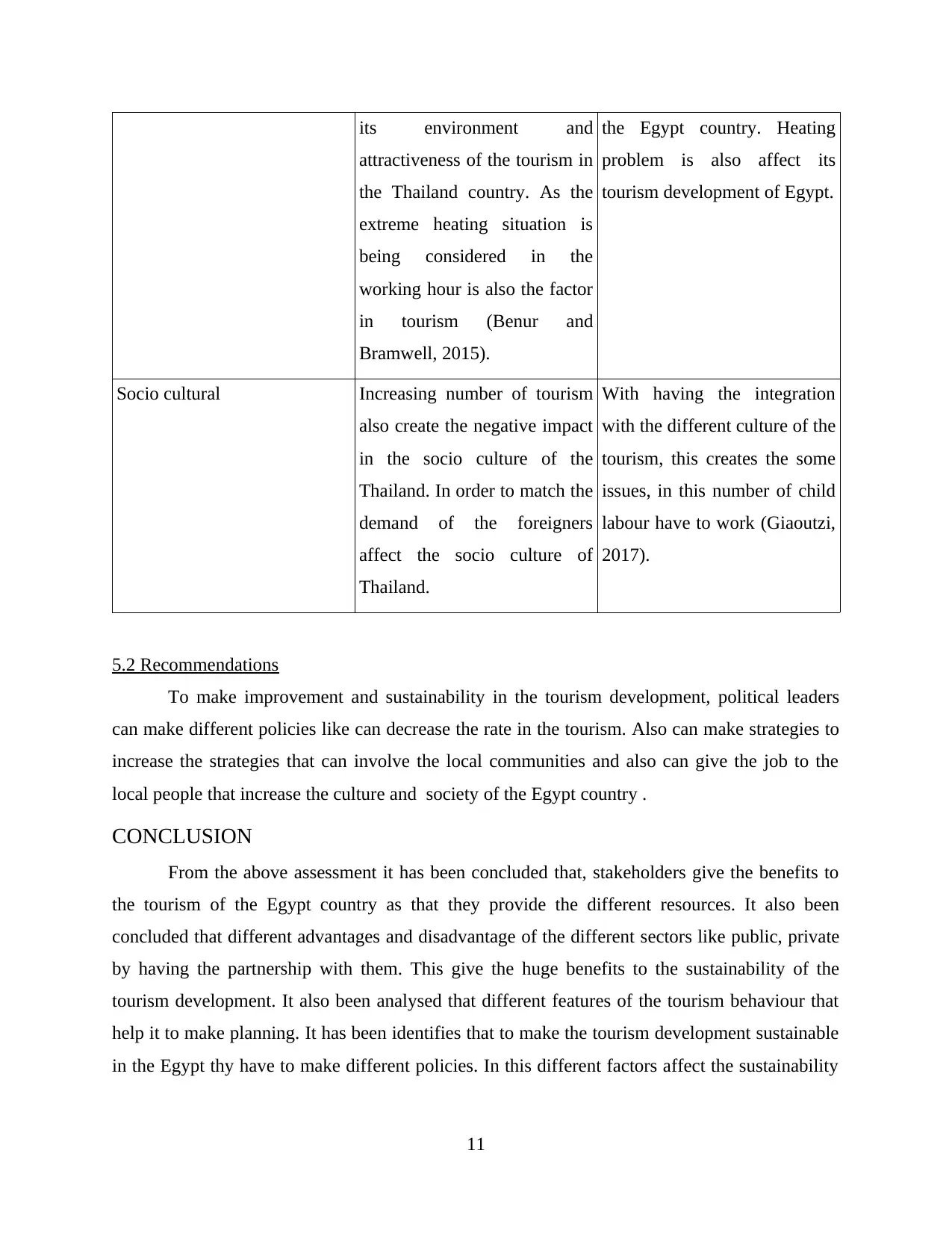
its environment and
attractiveness of the tourism in
the Thailand country. As the
extreme heating situation is
being considered in the
working hour is also the factor
in tourism (Benur and
Bramwell, 2015).
the Egypt country. Heating
problem is also affect its
tourism development of Egypt.
Socio cultural Increasing number of tourism
also create the negative impact
in the socio culture of the
Thailand. In order to match the
demand of the foreigners
affect the socio culture of
Thailand.
With having the integration
with the different culture of the
tourism, this creates the some
issues, in this number of child
labour have to work (Giaoutzi,
2017).
5.2 Recommendations
To make improvement and sustainability in the tourism development, political leaders
can make different policies like can decrease the rate in the tourism. Also can make strategies to
increase the strategies that can involve the local communities and also can give the job to the
local people that increase the culture and society of the Egypt country .
CONCLUSION
From the above assessment it has been concluded that, stakeholders give the benefits to
the tourism of the Egypt country as that they provide the different resources. It also been
concluded that different advantages and disadvantage of the different sectors like public, private
by having the partnership with them. This give the huge benefits to the sustainability of the
tourism development. It also been analysed that different features of the tourism behaviour that
help it to make planning. It has been identifies that to make the tourism development sustainable
in the Egypt thy have to make different policies. In this different factors affect the sustainability
11
attractiveness of the tourism in
the Thailand country. As the
extreme heating situation is
being considered in the
working hour is also the factor
in tourism (Benur and
Bramwell, 2015).
the Egypt country. Heating
problem is also affect its
tourism development of Egypt.
Socio cultural Increasing number of tourism
also create the negative impact
in the socio culture of the
Thailand. In order to match the
demand of the foreigners
affect the socio culture of
Thailand.
With having the integration
with the different culture of the
tourism, this creates the some
issues, in this number of child
labour have to work (Giaoutzi,
2017).
5.2 Recommendations
To make improvement and sustainability in the tourism development, political leaders
can make different policies like can decrease the rate in the tourism. Also can make strategies to
increase the strategies that can involve the local communities and also can give the job to the
local people that increase the culture and society of the Egypt country .
CONCLUSION
From the above assessment it has been concluded that, stakeholders give the benefits to
the tourism of the Egypt country as that they provide the different resources. It also been
concluded that different advantages and disadvantage of the different sectors like public, private
by having the partnership with them. This give the huge benefits to the sustainability of the
tourism development. It also been analysed that different features of the tourism behaviour that
help it to make planning. It has been identifies that to make the tourism development sustainable
in the Egypt thy have to make different policies. In this different factors affect the sustainability
11
⊘ This is a preview!⊘
Do you want full access?
Subscribe today to unlock all pages.

Trusted by 1+ million students worldwide
1 out of 13
Related Documents
Your All-in-One AI-Powered Toolkit for Academic Success.
+13062052269
info@desklib.com
Available 24*7 on WhatsApp / Email
![[object Object]](/_next/static/media/star-bottom.7253800d.svg)
Unlock your academic potential
Copyright © 2020–2026 A2Z Services. All Rights Reserved. Developed and managed by ZUCOL.





